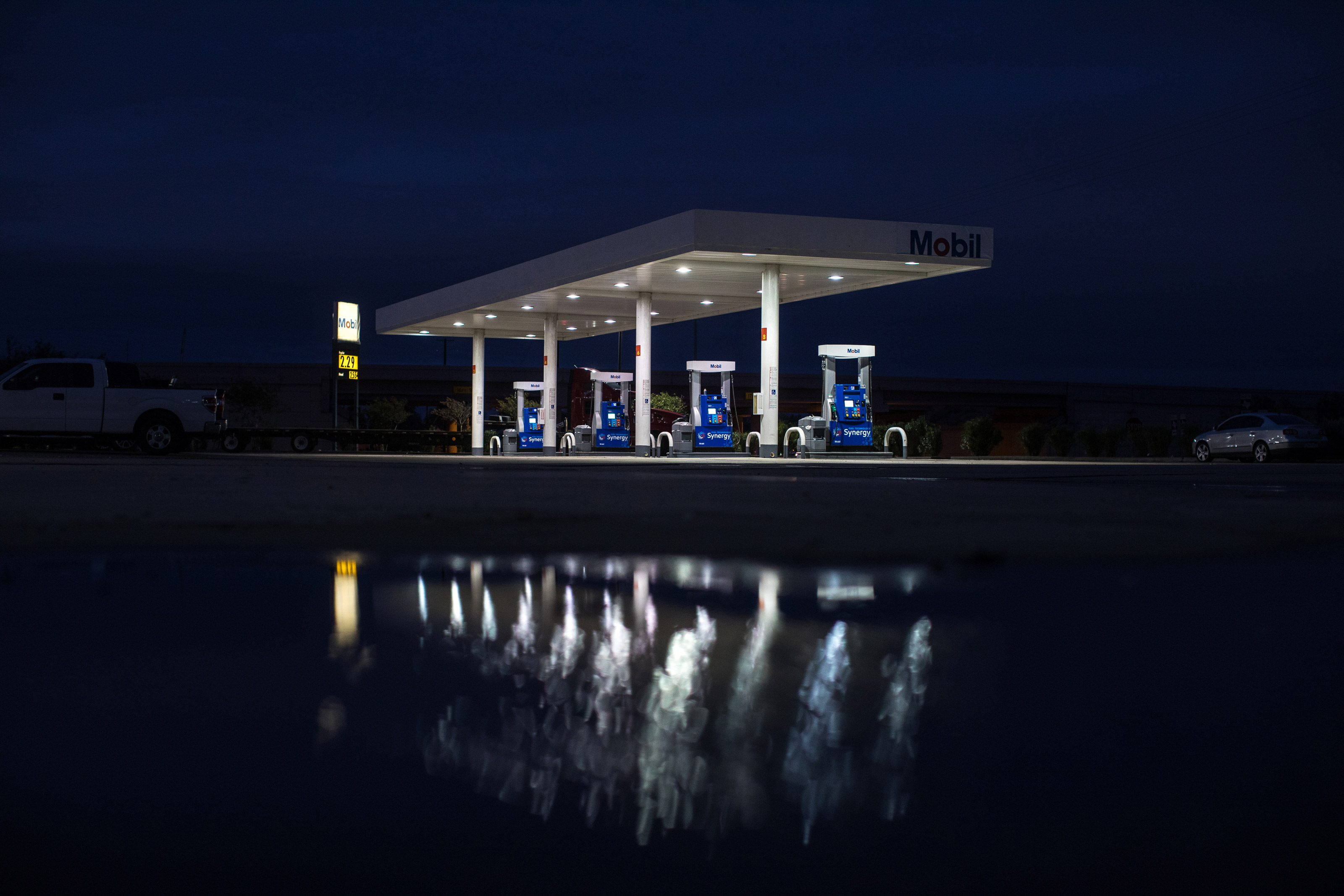This story was originally published by The Texas Observer and is reproduced here as part of a collaboration.
One day in April 2015, Nasser Farahnakian watched helplessly as the streets around his gas station in Corpus Christi flooded. That spring had seen a succession of severe thunderstorms in South Texas, smashing rainfall records and causing widespread flooding across this city of 300,000. As the waters rose around Farahnakian’s business, hundreds of gallons poured through a manhole into three underground storage tanks that hold gasoline and diesel. Underground, the grimy floodwaters mixed with the valuable fuel, rendering it unsellable. In late April, Farahnakian called a contractor to pump the water out of the tanks — the first of five times he would have to do so over the next month. Eventually the rains subsided and he figured the $8,000 expense was just part of being a gas station owner.
Four months later, an inspector with the Texas Commission on Environmental Quality (TCEQ) showed up for a scheduled inspection and asked to see an inventory of fuel, a routine request. The inspector pointed out that the records didn’t account for 800 gallons of fuel. Did it leak into the ground? Farahnakian tried explaining that the figures in the inventory records didn’t add up because the tanks had flooded and he’d hired a company to clean them out. He says he even showed the inspector the receipts from the contractor.
Watch the Grist mini-documentary on Texas regulators targeting gas-station owners.
It didn’t work. Farahnakian was shocked when he received a letter from TCEQ informing him that he was facing $59,000 in fines for recordkeeping violations — about two years’ worth of profits from gas sales at his store. Farahnakian was outraged. He’d done everything right. He hadn’t sold fuel mixed with water and had immediately cleaned the tanks. Automatic sensors in the tanks didn’t indicate a leak.
“We did everything to fix it,” Farahnakian said. “But the paper, the inventory, did not match.”
At age 26, Farahnakian had left Isfahan, the third-largest city in Iran, to get a Western education. It was 1976 and the country was on the verge of a political revolution. When he landed in Houston, he didn’t speak a lick of English and didn’t know anyone in the country. Farahnakian enrolled in language classes, secured a spot at a community college in Beeville and picked up odd jobs. He waited tables and washed dishes at a Mexican restaurant, making minimum wage, $2.30 an hour. At night, he drove a taxi, making $1 or $2 a trip.
When he was close to finishing his engineering degree, Farahnakian quit school. He found work at a bottling company, a job he hated, but one that allowed him to save money to fulfill his dream of owning his own business.
In 1988, after more than a decade in the country, Farahnakian was able to open a convenience store in Corpus Christi. As his business took off, he opened another store, then bought rental property and began leasing it out.
Eventually, in 2005, Farahnakian purchased land off Highway 44 and built his current gas station. The place has the comforting fluorescent glow of a familiar American institution. A sign outside reads “SUNRISE FOODS BEER ICE HOT DELI.” Inside, the store is conspicuously clean. The deli counter advertises breakfast tacos and “Chicken By The Pieces.”
As modest as it is, the store has helped make Farahnakian prosperous. “I never gonna go back working for somebody in my whole life,” he said. “If they give me million dollars, I don’t want to have a boss no more.”
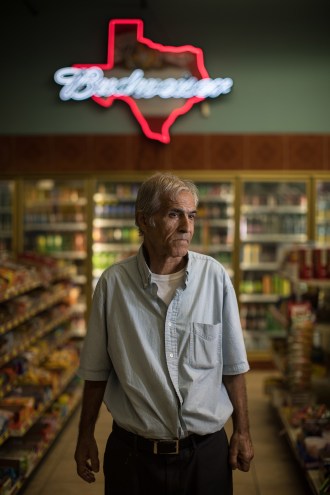
Nasser Farahnakian, a gas station owner who was fined $59,000 by TCEQ for recordkeeping violations, at his convenience store in Corpus Christi. Tamir Kalifa/Texas Observer
Sunrise Foods is located just down the road from the airport, and the nearest competitor is about 6 miles away. Along with rental income from other properties, Farahnakian and his wife are more than comfortable and now live in a posh part of Corpus Christi, in a 4,900-square-foot home made cozy with Persian rugs. “I’ve been working hard all my life and now I enjoy,” he said.
Still, the $59,000 fine stung. He could afford to pay it, but what about a less well-off gas station operator? “We’ve got volume, it’s OK,” he said. “But for a smaller gas station it’s kind of very rough. More [of] their profit goes toward TCEQ, which is very unfair.”
Unlike many other gas station owners, Farahnakian fought back. He hired a local attorney to contest the fines, and the case landed before a judge at the State Office of Administrative Hearings (SOAH), an agency that holds trial-like proceedings for legal disputes. After eight months of wrangling, during which Farahnakian provided documentation that he’d cleaned up the tanks, TCEQ agreed to settle for $27,000. Farahnakian took the deal. He says he had already spent $15,000 in lawyer fees and a year of his time dealing with TCEQ. Still, he’s upset at what he sees as the mismatch between the infraction and the size of the fine.
“Why we have to pay $27,000 for one violation?” he asked. “Which world is like that? Which country is like that? And there is no leak.”
In April 2015, just as Farahnakian’s woes were about to begin, a Citgo refinery a few miles away was malfunctioning. Citgo personnel had discovered that a stack at the plant was emitting more hydrogen cyanide than its air permit allowed. For two months, as Citgo later reported to TCEQ, the plant released more than 50,000 pounds of hydrogen cyanide into the air. Exposure to the chemical at high levels can be toxic to human health. Two and a half years later, TCEQ is still deciding whether to punish the company at all, and is even considering a request from Citgo to simply amend its air permit to retroactively bless the pollution.
Citgo owns and operates two large refineries in Corpus Christi. Sitting at the edge of Nueces Bay, the 890-acre expanses of steel, towering stacks and massive storage tanks are feats of engineering. Every hour, they together churn through more than 6,500 barrels of crude oil, spitting out, among other products, gasoline that Farahnakian has purchased for his gas station. According to state data, they’re also some of the biggest polluters in Texas. Combined, the two refineries emit more than 3,800 tons of hazardous pollutants a year, spewing carbon monoxide and volatile organic compounds — exposure to many of which has been correlated with lung and breast cancer — as well as nitrogen and sulfur oxides, which worsen respiratory illnesses in the young and elderly and contribute to haze in the region.
From 2012 to 2017, the plants released more pollution than allowed by their permits 66 times, including the April incident, according to public data. TCEQ fined the company in only four cases and initially issued just $82,400 in fines. In three of those cases, however, Citgo unleashed its legal department on TCEQ. In all four cases, TCEQ reduced fines because of “good faith” efforts and timely payments. Eventually, Citgo paid just $42,500 — a little more than a dollar per pound of pollution — for all four cases.
Farahnakian makes a few thousand dollars a month from selling sodas, beer and gas at his store; Citgo has annual revenues reportedly north of $40 billion. Farahnakian is a first-generation immigrant who isn’t fluent in English and is unfamiliar with the state’s regulatory system; Citgo has significant political and financial capital that it can use to fight TCEQ. Farahnakian was punished for recordkeeping violations and there is no evidence of gas leaking out of his tanks; Citgo admitted to pumping 50,000 pounds of hydrogen cyanide into the air. Yet Farahnakian’s penalty for a recordkeeping error was about the same as Citgo’s fine for releasing toxic air pollutants over five years.
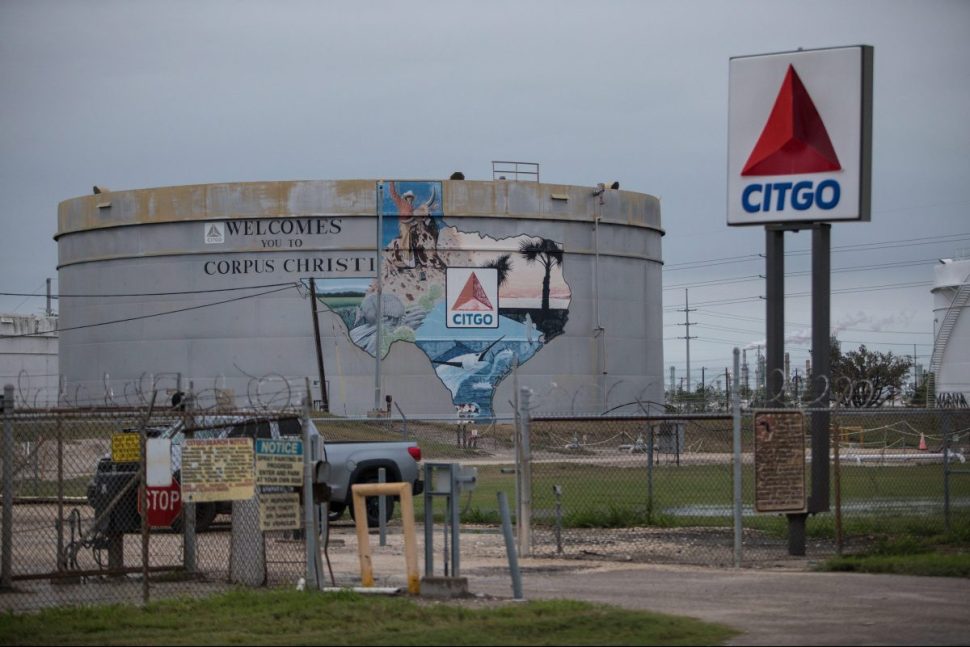
A Texas-themed welcome sign is painted on the side of a tank at one of Citgo’s Corpus Christi refineries. Tamir Kalifa/Texas Observer
Farahnakian isn’t an exception. He’s one of hundreds of Texas gas station owners, often first-generation immigrants, who have been fined for missing or incorrect paperwork, even as big corporations receive lesser punishment for releasing dangerous pollutants. The Observer analyzed more than 300,000 rows of data related to TCEQ’s enforcement activity from 2009 to 2017 in an effort to assess the priorities of the nation’s fourth-largest environmental agency. The analysis found that TCEQ collected $24 million from tank operators, the vast majority of whom are gas station owners. That’s only slightly lower than the $30 million it collected from the thousands of industrial facilities — refineries, petrochemical plants, cement batch plants — across the state that violated their air permits.
The Observer’s analysis also found that the agency devotes considerable resources to policing gas stations. Cases against underground storage tank owners make up about 40 percent of TCEQ’s total enforcement workload, and 85 percent of the 4,200 cases against gas stations simply involved poor recordkeeping. In contrast, industrial polluters self-reported 500 million pounds of pollutants from 2011 to 2017. Yet TCEQ failed to levy fines against such violators 97 percent of the time during the same period, according to a 2017 report from two environmental groups critical of TCEQ. And when it did, the state came down much harder on small business owners: The Observer found that the average penalty for petroleum tank owners, $1,250, was double that of industrial air polluters, $580.
The disparity between TCEQ’s treatment of mom-and-pop operations versus large corporations is no accident. The regulatory apparatus seems built to favor those with money and power. The agency rarely punishes big polluters, often because they invoke a legal loophole that allows pollution associated with plant startup, shutdown or malfunctions. Even in the event of a fine, companies typically lawyer up, negotiating big reductions in penalties. As a result, environmental advocates and small business owners say there’s a fundamental unfairness at work with the way TCEQ treats its “customers,” as it refers to businesses it regulates.
“Fines should be tailored to their impact on the business,” said Luke Metzger, executive director of the nonprofit Environment Texas, which has criticized TCEQ for failing to hold air polluters accountable. “The fines should also reflect the seriousness of the violation. Whenever the public is being exposed to potentially harmful pollutants, penalties should be at their absolute highest. On both counts, TCEQ fails miserably.”
Andrea Morrow, a spokesperson for TCEQ, provided the agency’s own analysis, which is mostly similar to the Observer’s findings. For example, TCEQ found that petroleum tank users made up 33 percent of the agency’s caseload, while the Observer calculated 40 percent. Morrow also took issue with the characterization of certain violations and defended the practice of using records to identify potential environmental hazards. She also said that leaking petroleum tanks pose health and environmental risks as well as “the potential for fire and explosion.”
“[R]ecordkeeping violations may not be simple ‘paperwork’ violations,” she said. “In many cases, the records required may be the only way a potential release can be identified and addressed before significant environmental harm is done.” She disputed the Observer’s finding that 85 percent of violations were related to recordkeeping and argued that those violations were misinterpreted. She also claimed that paperwork-related cases account for less than 1 percent of all violations cited in commission orders.
Morrow said the agency has been holding workshops to educate gas station owners about the regulatory requirements, adding that enforcement is “merely one tool” it uses to protect the environment. Still, she said “the sheer size” of the gas station industry “combined with high employee and ownership turnover … makes it difficult to reach everyone.”
Farahnakian, who has agreed to pay the $27,000 fine in 36 monthly payments of $750, is upset that TCEQ is making it more difficult to operate in an industry that is already challenging for small businesses.
“[TCEQ] try to get you out of this business,” he said. “Anybody can miss something, or water can get in the tanks. … But they get hard on us, not for them. For the foreigner, for the individual owner.”
The retail gasoline and convenience store business is one of slim margins, high turnover and uncertainty. Day-to-day fluctuations in gas prices, ever-changing regulations and high overhead costs all make it difficult to stay afloat in the industry. There’s even the apparently common problem of inattentive people driving off with the gas nozzle still stuck in the vehicle — a screwup that can cost the owner thousands of dollars. According to the Small Business Administration, about 48 percent of Texas’ small businesses are minority-owned. Though the agency doesn’t have demographic data by industry, experts told the Observer that a significant percentage of the 20,000 or so gas stations in Texas are owned and operated by immigrants, predominantly from Asia and the Middle East.
Scott Fisher, the senior vice president of policy and public affairs with the Texas Food and Fuel Association, an industry group that represents gas stations and convenience stores, said that in the 1970s and 1980s, the gas station business was likely attractive to immigrants because of the low barrier to entry. Loans were easy to secure and the down payments were typically smaller than what’s required today. Regulations were simple and easy to navigate; inspections were few.
“It looked like a pretty good way to get established and take care of your family,” Fisher said.
In the 1980s, however, it became increasingly clear that leaking petroleum tanks posed a major threat to groundwater, and pressure mounted on Congress to crack down. At the time, the EPA estimated that one-quarter of the approximately 2 million tanks in the country were leaking. Of particular concern was MTBE, a powerful octane booster and carcinogen that renders groundwater undrinkable even when present in tiny quantities.
Congress gave the EPA jurisdiction over underground tanks in 1984 and ordered the agency to step up its policing. But in the late 1990s, the EPA still had a major problem on its hands.
In 1998, researchers at the Department of Energy found traces of gasoline chemicals in groundwater at more than 13,000 California sites, and in 2001 and 2005, the Government Accountability Office published scathing reports on the lack of funding for cleanups. “Most states and EPA do not physically inspect all underground storage tanks frequently enough or have access to the most effective enforcement tools to ensure compliance with federal requirements,” the 2001 report noted.
In 2005, under mounting pressure from activists and lawmakers, Congress passed the Energy Policy Act, an omnibus energy bill that increased funding to states for tank cleanups. Among the key provisions: States receiving federal assistance would have to conduct inspections of gas stations every three years.
Taking the federal money now meant putting gas station owners under much closer scrutiny. Unlike most states, Texas officials rebuffed the federal government, according to an EPA spokesperson. (Morrow said that TCEQ wasn’t aware of additional funding being declined.)
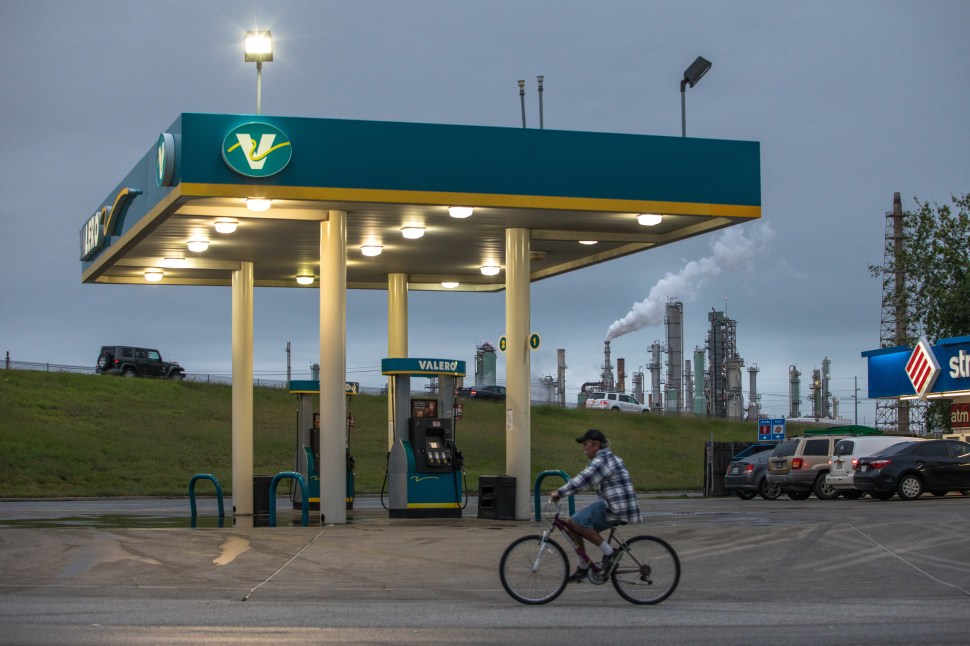
Tamir Kalifa/Texas Observer
But in 2009, as part of the Obama administration’s stimulus package, TCEQ was offered a windfall — $10.8 million over two years if it would conduct routine inspections. The agency farmed most of the work out to the University of Texas at Arlington through a $2.5 million contract. The effect was immediate and drastic. In 2009, the year before the contract went into effect, TCEQ conducted about 5,700 inspections and issued $3.5 million in fines. Four years later, in 2013, the number of inspections more than doubled to about 13,200, and fines increased to almost $5 million.
The increase in inspections “was the single biggest change from that law,” said Cliff Rothenstein, who headed EPA’s Office of Underground Storage Tanks during the George W. Bush administration. Prior to the Energy Policy Act, most of the money was provided to clean up leaking tanks, he said, but after the law passed states received millions for inspections.
There’s little doubt that the program has succeeded in reducing pollution. In Texas, the number of documented spills and leaks from petroleum storage tanks has decreased from 354 per year in 2006 to 285 in 2016. “It’s a big achievement,” Rothenstein said.
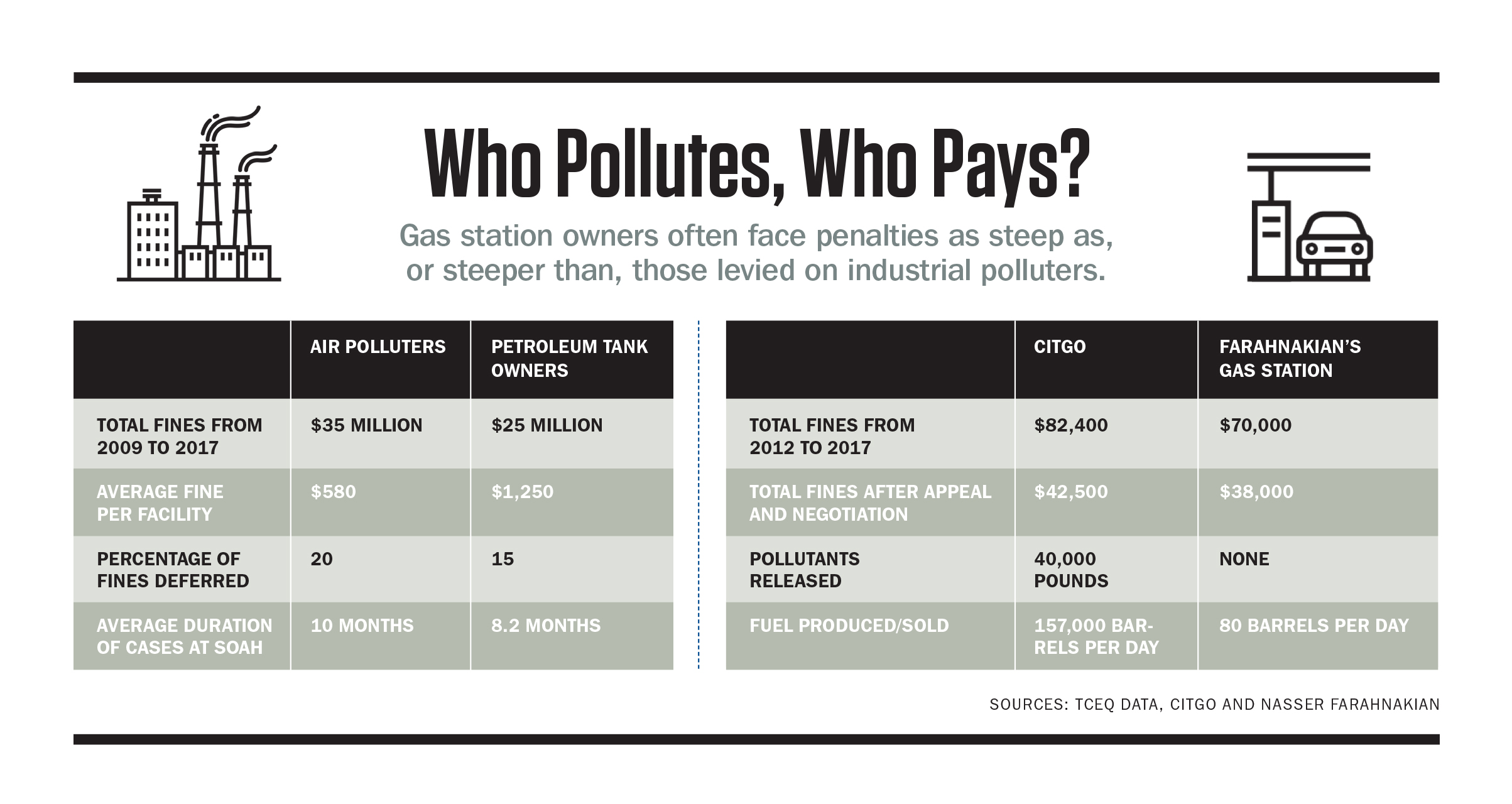
Many gas station owners told the Observer they don’t object to fines in the event of a leak. They also conceded that the regulatory crackdown has prompted them to be more attentive to the records, and some have hired compliance firms to keep their books in order. But they also noted that TCEQ has discretion when it comes to how harshly it punishes polluters. They questioned why TCEQ doesn’t show the same zeal for deterrence when it comes to some of the biggest polluters in the state, often the very petrochemical companies — Citgo, Valero, Shell, Exxon —from which they must purchase gas.
Only 7 percent of the tanks inspected from 2009 to 2017 had a documented spill or leak at some point in their history. In fact, in TCEQ’s data, the Observer was able to identify only six cases where an inspector found evidence of contamination. In the vast majority of cases, TCEQ became aware of a leaking tank when an owner reported it to the agency.
The most common citation is for failing to maintain accurate inventories. Gas stations and other businesses with fueling stations, such as hospitals and car washes, are expected to maintain more than 40 sets of records at any given time. Some, like the gas inventories, need to be updated every day. Others have to be renewed monthly or yearly. In Farahnakian’s case, there was a discrepancy of 800 gallons of fuel, the result of the five times he had to have the tanks pumped dry. Official TCEQ forms provide a space for indicating when gasoline is delivered or sold, but not for when fuel is removed from the tank during a cleaning. Two inspectors told the Observer that they view “missing” gas as an indication that it might have leaked out of the tanks.
Under Texas regulations, Farahnakian was supposed to report the issue to TCEQ and hire a company to investigate the source of the errors. He says he didn’t do either because he didn’t know they were requirements. As a result, his initial fine grew under what is known in regulatory circles as “cascading violations.”
TCEQ dinged him $9,016 for not maintaining records for an automatic leak sensor in one of the tanks, $4,508 for failing to report the inventory discrepancy and $45,082 for not hiring an investigator to look into the discrepancy. It added up to $58,606. If TCEQ had penalized him for just the first violation, Farahnakian would have had to pay only the $9,016.
Farahnakian points out that he had installed probes in the tank to alert him if there were a leak.
“We find out, we have monitoring there,” Farahnakian said. “We press it and it says no leaks. … They don’t care about this. All they need is fine. Big fine.”
Morrow did not respond to questions about the violations at Farahnakian’s gas station. Instead, she said that the agency’s executive director “considers all available evidence when determining the violations, penalty and corrective actions to include in an enforcement action.”
For mom-and-pop gas station owners, the fines can take a financial and emotional toll.
In 2015, a TCEQ inspector found that Jamal Jafari, a Palestinian American who owns a gas station in Fort Worth, hadn’t conducted a corrosion test and had left required leak detectors unplugged. Though the inspector didn’t find any signs of a leak or a spill, Jafari was still smacked with a $6,500 fine. It took such a toll on his finances that he says he would shut down the pumps if it wouldn’t affect sales in the convenience store.
Jafari’s family fled Palestine in 1976 when he was 6 years old; the family lived in a Jordanian refugee camp during his school years. His five sisters, brother and parents all slept in a 10-by-10-foot shack, he recalled. After high school, Jafari secured a visa to come to the United States. He took English classes in Chicago and enrolled at Harold Washington College. Later he moved to Texas to take classes to become a pilot. But he couldn’t afford the schooling and quit to take a job at a gas station.
Over the next five years, Jafari saved enough money to open his own gas station in Fort Worth. Jafari, who is Muslim, thinks immigrants like him are unfairly penalized, in part because they’re less likely to put up a fight.
“We [have] this feeling, they target us,” Jafari said. “‘We fine them, they cannot go to lawyer, some of them they don’t speak English and they scared.’ … I came to this country and I don’t know all the rules, just like [when an] American goes to my country, he don’t know all the rules.”
Jafari says he sells only about 30,000 gallons of gas a month at a profit of 5 cents a gallon — about $1,500 a month. After debit card fees, he typically makes less than a dollar per fill-up. Like most gas station owners, Jafari counts on customers coming into the store for other goods.
“I hope he buy soda pop, a cigarette, a bag of chips [and] I’ll make the difference,” Jafari said. “But the gas, nobody makes money on gas. They keep it just to keep the customer happy.”
TCEQ allowed Jafari to go on a payment plan — $540 a month for 12 months — but he struggled to scrounge together the funds. Sometimes he would skip a month or two and pay a lump sum once he’d saved up enough. He says he and his family — his wife and 10 children — had to cut back on groceries and skimp wherever they could.
“It put me in a hole,” he said. “It’s hardship on me, my family and everything.”
On a warm fall morning in South Texas, Gary is rushing from one gas station to the next in a white pickup truck with TCEQ’s blue-and-green logo on the side. One of more than 450 investigators employed by the agency, Gary expects to inspect three gas stations within an hour and a half this morning. He’s just wrapped up the third store — an HEB, where he spent 20 minutes — and is pulling into a Stripes he’d inspected earlier in the morning.
(I’ve changed Gary’s name because he fears he could lose his job by speaking to the media.)
Gary says he had an easy time with the inspections that morning because they were all corporate-owned gas stations. Employees from Stripes and HEB were present to answer any questions, and they had already emailed Gary the records he needed to review.
“The corporate ones are the easy ones to write up, because they give us the documents and we can type it up as quickly as possible,” he said. “The mom-and-pops … it takes us a little bit longer to get everything.”
On any given day, Gary may be investigating a tire fire in the morning and responding to complaints from neighbors living next to a scrap metal plant in the afternoon. Because there are so many gas stations to inspect, TCEQ wants inspectors to fly through them, Gary says. He says he’s expected to take just five hours from start to finish, though he sometimes needs at least seven to do the job right. (Morrow disputed this timeframe, saying that investigators take 15 hours on average.)
TCEQ requires its inspectors to have reports approved within 60 days of the inspection, a deadline that Gary says inspectors often rush to meet. While he takes the time to help small business owners find records that satisfy the rules, other inspectors may not have the patience, he says.
“When [politicians] say you’re overburdening [businesses] with regulation, what they’re really saying is you’re overburdening the big corporate people,” said Gary. “You’re not really thinking of the mom-and-pops.”
Another hurdle for some small business owners is that many speak English as a second language. Under the 1964 Civil Rights Act, entities that receive federal funding are expected to provide equal access to services, regardless of race, color and national origin. Courts have generally interpreted the law to include providing language assistance to people whose primary language is not English.
TCEQ appears to have taken some steps to provide language assistance. Morrow, the TCEQ spokesperson, said that whenever agency staff run into communication barriers, they “rely on available internal or external resources,” including staff who “are fluent in a variety of languages,” Spanish speakers in the agency’s small business program, and the EnviroMentor program, where environmental professionals volunteer their time to assist small businesses.
Still, it’s unclear how often those services are used. Based on interviews with nine gas station owners and two inspectors, many gas station owners don’t know that the agency provides translation services. Take, for instance, Joginder Singh. He quit school after eighth grade in Hathur, a small farming community in rural Punjab, India, and as a young adult worked at a Nestle milk collection center. He was “struggling, struggling” to make money, he recalled, and told his father, “Don’t worry… one day I’m going to the other country.”
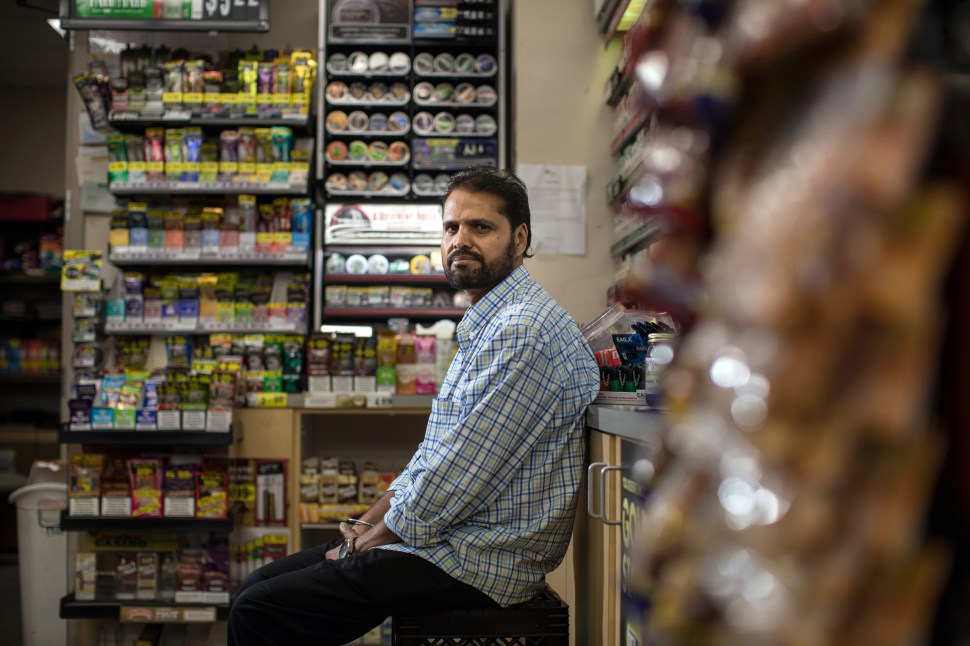
Joginder Singh at his gas station in Floresvllle. Tamir Kalifa/Texas Observer
In 1998, at age 35, Singh got a visa to the United States and flew to Syracuse, New York. There he found work as a gas station attendant, but Singh didn’t speak a word of English, and his boss fired him, telling him he couldn’t employ someone who wasn’t able to communicate with customers. Eventually, Singh picked up a little bit of the language, moved to Fresno, California, and later came to Texas with his cousin in the hopes of owning and running gas stations with him.
One cold December morning, Singh walks me to a small, cramped office at the back of his gas station in Floresville, a small town southeast of San Antonio. He opens a gray filing cabinet filled with files marked “TCEQ #1” and “TCEQ #2.”
In 2016, a routine inspection landed Singh in trouble. A contractor with UT-Arlington inspected his gas station and found that Singh hadn’t tested the pipes leading from the underground tanks to the pumps. The inspector told him to get the leak test done in the next week. Singh followed the instructions and the test came back clean, but he was still slapped with a $5,800 fine. When Singh told a TCEQ staffer over the phone that he wanted to contest the case, he says he was threatened.
“He said, ‘If you go before the judge, judge from TCEQ, he no listen to you, he listen to me,’” Singh recalled. Discouraged, Singh didn’t bother to appeal. (Morrow did not respond to a request to comment on Singh’s allegation.)
Singh says no one ever bothered to inform him that he had a right to a translator at no cost. With a Hindi or Punjabi translator, he might’ve had a clearer understanding of the violations and how best to defend himself.
“They need to ask first time, ‘Hey Mr. Singh, hey Mr. Kumar, hey Mr. Benjamin, hey Mr. Lopez, you need interpreter?’” Singh said. “If they give me the translator between lawyer, any judge, whatever, I can more fighting myself. I can more fighting there.”
The contract between TCEQ and UT-Arlington spells out that the university must comply with the Civil Rights Act: “As a recipient of EPA financial assistance, you are required … to provide meaningful access to [Limited English Proficiency] individuals.” The university also “has an affirmative obligation” to “ensure that its actions do not involve discriminatory treatment.”
Marianne Engelman Lado, an environmental law professor at Yale University, said that the legal argument for translating the violation notices and enforcement documents is “pretty strong.” According to Engelman Lado, the EPA has determined in response to a Clinton-era executive order that agencies need to translate certain “vital” documents to the respondent’s primary language. TCEQ’s enforcement letters and orders fit that definition, she said.
In Singh’s case, despite the fact that he primarily speaks Punjabi and Hindi, TCEQ sent letters in English notifying him that he was in violation of state laws and owed the state money.
“I come from India and I don’t have education,” said Singh. “How I can read everything?”
In New York, CVS and Walgreens pharmacies offer medical information in 16 different languages, using translation software.
“Technology has become easier and easier and access to translation has become easier and easier,” Engelman Lado said. “So an organization or an agency with resources, they should be able to at least give out notice and then provide these vital documents in people’s languages.”
Morrow did not respond to specific questions about which documents TCEQ translates, but said broadly, “As a recipient of federal funding, the TCEQ must follow Title VI of the Civil Rights Act of 1964.”
The system offers luxuries to large companies that are simply not available to Jafari, Singh and Farahnakian. First, TCEQ very rarely fines companies for violating their air pollution permits. For example, from 2005 to 2013, the agency declined to pursue fines in 152 cases against Exxon, or 63 percent of the company’s self-reported emissions events. In total the agency issued just $1.4 million in fines to Exxon, little more than mildly wagging its finger at the multinational behemoth.
But the extent to which the system is rigged in favor of Exxon came to light during a lawsuit that environmental groups filed against the company. Texas law allows air polluters to avoid penalties if the emissions occurred during plant startup or shutdown or because of a malfunction. However, during the trial, an Exxon official testified that the company reflexively uses that justification no matter the circumstances. The trial also showed that even when TCEQ fined Exxon, it allowed the company to dictate the terms. A top agency official testified that Exxon was allowed to write the first draft of a 2012 enforcement order and had significant input into the final version.
In 2017, the federal judge ruled against Exxon, finding that the company gained nearly $14.3 million in economic benefits by delaying projects that would’ve reduced emissions. Exxon was ordered to pay almost $20 million.
The Exxon judgment was a rare win. Refineries, petrochemical plants and other polluters under TCEQ’s purview still routinely claim that all excess emissions are related to startup, shutdown or malfunctions. Usually, the strategy works. In Citgo’s case, for instance, the company appealed three of the four times it exceeded its permit from 2012 to 2017. In all three cases, the company claimed the emissions were legal, successfully reduced the fine, and avoided admitting to any wrongdoing.
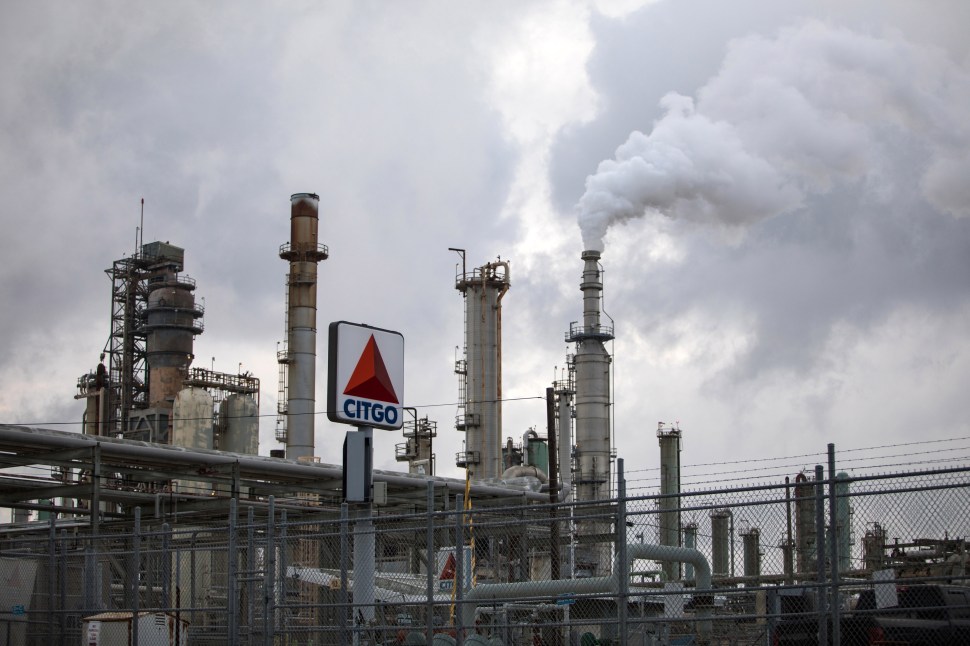
An oil refinery in Corpus Christi owned by Citgo. Tamir Kalifa/Texas Observer
In one 2012 incident, the Citgo West plant in Corpus Christi released more than 25,000 pounds of sulfur dioxide and more than 400 pounds of a slew of other chemicals, including carbon monoxide, hydrogen sulfide and nitrogen oxides. The emissions went on for more than a day, but the company failed to report them within 24 hours as required. TCEQ fined Citgo $50,500. But the company then simply claimed it was an authorized emission and appealed the case to SOAH. Ultimately, TCEQ settled with Citgo for $13,100.
“These guys have millions of dollars, literally, to spend on lawyers and lobbyists and will put up a fight, and, on the other hand, we know a gas station owner doesn’t have those resources,” said Metzger with Environment Texas. “Even if he or she wanted to go to SOAH or the courts, they likely don’t have the money or the time or the expertise to be able to mount any kind of real defense.”
Indeed, very few tank cases get appealed. From 2009 to 2017, only about 250 of the 4,200 underground storage tank cases — fewer than 6 percent — were appealed to SOAH, according to the Observer analysis. Jafari, the Fort Worth gas station owner, explained his decision not to appeal this way:
“If I request a hearing, I gotta go to Austin, I gotta hire a lawyer,” he said. “I’m taking a chance, maybe I win, maybe I lose. [If I lose], I have to pay the lawyer. So, excuse my language, we just say shut up and pay it and get it over with.”
What would a fairer system look like? Adrian Shelley, the executive director of the consumer advocacy group Public Citizen Texas, said that deciding how to prioritize industries is “a deep question in public health and environmental enforcement.” The Observer’s analysis raised a “social justice question” and showed that TCEQ’s priorities were “skewed,” he said.
“If they’re going after small business owners that don’t have a lobby to support their interests in the state, that’s unjust,” he said.
Metzger said TCEQ behaves like a schoolyard bully, picking on those who are least able to fight back. “TCEQ largely lets major corporations off the hook while disproportionately going after the smaller operators,” he said. “It’s not fair and it’s not very protective of public health for them to be going after the little guys and look the other way when the big polluters break the law.”
For Farahnakian and other gas station owners, the issue comes down to one of equity. The punishment should fit the crime.
“For big refinery, [a few thousand] is nothing,” he said. “It’s penny in the pocket. Why it’s like that? They should pay big fine and we should pay a small fine, compared to the money volume or business volume.”
Farahnakian is now semi-retired. Glaucoma has affected his eyesight and he walks haltingly. His daughter, Roya, takes care of the day-to-day operations at the gas station. “It’s her business now,” he beams.
Having been burned once, he’s more careful now about recordkeeping. He has hired a compliance company to keep track of the daily inventory records. While he doesn’t regret getting into the gas station business, he says the large fines have deterred him from opening another gas station, and he wouldn’t recommend that Roya open one, either.
“I told myself I’m not going to open no more gas station,” he said. “If they’re going to be hard on us like this, why you want to open a station? All this paper, all this records, all this things for what?”
This article was reported in partnership with The Investigative Fund at The Nation Institute.

